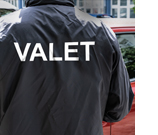Insights
 The Impact of Technology on Valet Parking
The Impact of Technology on Valet Parking
June 15, 2023
Data-driven technologies have transformed industries across sectors, allowing for improved efficiency, cost savings, and security. The valet parking industry is no exception; emerging tech has provided new ways of doing business. In this article, we illustrate the potential benefits of valet parking technologies and present potential liability concerns that influence the future of the valet industry.
To learn more about U.S. Risk and its comprehensive insurance packages for parking and valet services, visit our ArmorPark page.
Technology in Parking Operations: Potential Benefits and Emerging Challenges
Technology has a significant impact on valet parking operations, with implications that are transforming the industry in several critical ways:
- Efficiency and Productivity: With technology such as automated valet parking systems, businesses can streamline the process and reduce waiting times. For example, valet staff can use mobile devices or tablets to track vehicles and their locations digitally, eliminating manual processes and human error.
- Customer Experience: Apps and digital platforms allow customers to request their cars, pay for the service, and even track their car’s location in real-time, offering a better customer experience.
- Data Collection and Analysis: Digital tools enable valet services to collect and analyze data about customer behavior, busy periods, and other operational metrics. This can help to optimize staff deployment, improve service, and increase profits.
- Security: GPS tracking and surveillance technology can help to improve the security of vehicles under the care of a valet service, reassuring customers about the safety of their vehicles.
- Automation and Robotics: Looking to the future, automated or robotic valet parking could significantly disrupt the industry. With self-driving car technologies, vehicles could park themselves once dropped off, increasing efficiency and reducing the need for human staff. This, however, could have significant employment implications.
- Environment: Reduced idling and more efficient parking practices enabled by technology can contribute to decreasing the carbon footprint of the valet parking industry.
- Revenue Management: Dynamic pricing models can be introduced based on real-time demand and supply data, increasing revenue opportunities for the valet parking businesses.
However, these advancements come with their challenges. The introduction of automated systems may reduce the need for human staff, leading to potential job losses. Companies will also need to invest in new technologies and train staff to use them, increasing costs.
Cybersecurity will become increasingly important as more data is digitized, and regulatory frameworks may need to evolve to cover new developments, like self-parking cars.
Despite these challenges, the future of valet parking appears to be moving towards increased use of technology, resulting in more efficient and customer-centric services.
Insurance Implications for the Valet Industry
The introduction of technology in valet parking operations can significantly affect insurance liability in various ways:
- Loss Prevention: Technology such as GPS tracking and surveillance cameras can help mitigate the risk of theft or damage to vehicles. If an incident occurs, video footage can be used as evidence, reducing disputes and liability claims. As a result, this could potentially lower insurance premiums.
- Reduced Human Error: Automation can decrease the chance of human error, such as misplacing keys or damaging vehicles during parking. Again, this could reduce the number of claims and, therefore, the cost of insurance.
- Data Collection: Digital tools enable better record keeping, which can provide accurate data in the event of a claim. This can make the claims process smoother and faster. It also provides evidence that could protect valet companies from fraudulent claims.
- Autonomous Valet Parking: With the emergence of autonomous vehicles, there could be a shift in insurance liability. If a self-parking car was to be involved in an accident, the vehicle manufacturer or software provider might be held liable rather than the valet service.
However, these technological advancements also present new risks and challenges:
- Cybersecurity Risk: As valet services increasingly rely on digital platforms and data, they become more exposed to cyber threats. If customer data were to be breached, the valet service could be held liable for any losses incurred. As a result, they may need to maintain cybersecurity insurance coverage.
- Technology Failure: If a digital system were to fail, causing loss or damage (for example, a car is not properly tracked and is stolen), the valet service could be held responsible. Insurance policies would need to cover these types of risks. Traditional general liability and garagekeepers legal liability policies may not meet emerging liabilities; innovative insurance providers have begun to implement coverages tailored to the unique risks associated with valet automation technologies.
- Regulatory Changes: As mentioned earlier, the shift towards autonomous vehicles will likely lead to regulatory changes, which could impact insurance requirements and liability.
It’s clear that while technology has the potential to reduce claims and lower insurance costs, it also presents new risks that need to be managed and insured against. This underscores the need for valet parking operations to work closely with their insurance providers to ensure they have the right coverage as they adopt new technologies. ◼
